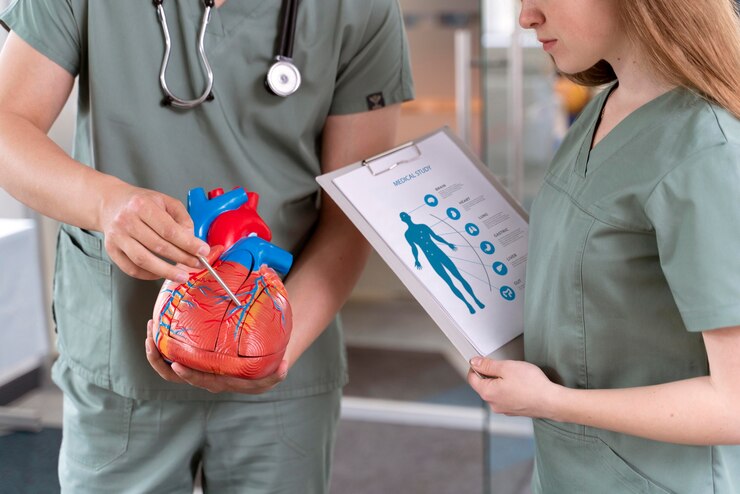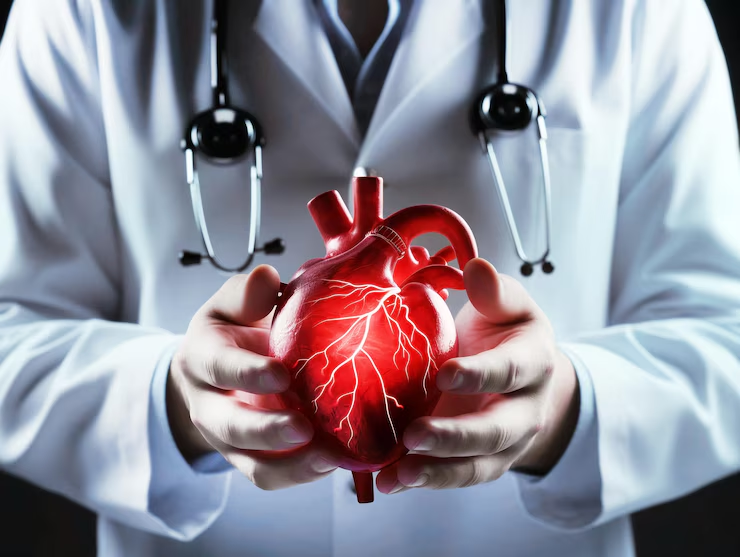Heart Health First:
Innovative Treatments for a Stronger Tomorrow
SYMPTOMS

- Chest Pain (Angina): It is a feeling of discomfort or pain in one’s chest marked by pressure, squeezing or fullness or pain which may radiate to arms, shoulders, neck and jaw.
- Shortness of Breath: This occurs when you have difficulties breathing, especially during physical activities.
- Fatigue: Also, it may be marked by feeling tired after exertion.
- Heart Attack Symptoms: These are severe chest pain, difficulty breathing, sweating, and dizziness, among others. Women may also experience non-typical symptoms such as backache or jaw pain, shortness of breath and nausea.
- Palpitations: A perception that one has a fast heartbeat pounding heavily or fluttering inside their chest repeatedly.
- Dizziness or Lightheadedness: Feeling faint, sometimes leading to fainting episodes known as syncope, where people tend to fall without control over their bodies.
- Chest Pain: A discomforting feeling experienced at the upper part of one’s body near the neck region.
- Shortness of Breath: An inability to breathe correctly during instances when there is an arrhythmia taking place
- Fatigue: General tiredness characterized by weak muscles.
- Shortness of Breath: Especially when lying down or during periods of physical exertion.
- Fatigue or Weakness: When you feel more tired and weak than usual.
- Swelling (Edema): An abnormal accumulation of fluid in the cavities beneath the skin.
- Heart Murmurs: These are sounds from the heart that can be heard using a stethoscope by medical doctors as they are performing their duties.
- Chest Pain or Discomfort: It can be experienced when someone is struggling to work hard.
- Shortness of Breath: After activity or while lying down.
- Persistent Cough or Wheezing: This refers to coughing regularly and producing white or pink mucus with blood stains in it
- Swelling (Edema): This condition occurs on legs, ankles, and feet while fluids are retained in the body tissues.
- Fatigue and Weakness: A constant feeling of tiredness and lack of energy.
- Rapid or Irregular Heartbeat: One feels like their heart is beating very fast, either once per beat.
APPROACHES FOR HEART DISEASE TREATMENT
Treatment for heart disease may encompass various strategies that are contingent on the specific type of heart disease, its severity and the overall well-being of the patient. The main objectives are relieving symptoms, lowering complications and risks and halting progression. It may involve lifestyle changes, medications, medical procedures or surgery.
- Diet
- Exercise.
- Weight Management
- Smoking Cessation
- Alcohol Moderation
- Antihypertensives
- Statins
- Antiplatelet Agents
- Anticoagulants
- Diuretics
- Nitroglycerin
- Angioplasty and StentingCoronary Artery Bypass Grafting (CABG)
- Cardiac Catheterization
- Pacemakers and Implantable Cardioverter Defibrillators (ICDs)
- Valve Repair or Replacement
- Heart Transplant
- Left Ventricular Assist Devices (LVADs)
- Exercise Training
- Education and Counseling
- Regenerative Medicine
- Gene Therapy
- Novel Medications
WHEN TO SEEK MEDICAL TREATMENT
If you have any of these symptoms, it is essential to see a doctor right away, especially if they are severe or come on suddenly. Timely recognition and treatment can significantly enhance the prognosis for patients with heart disease. Also, routine visits to a health care provider may assist in managing risk factors and stopping or slowing down the development of heart illness.

